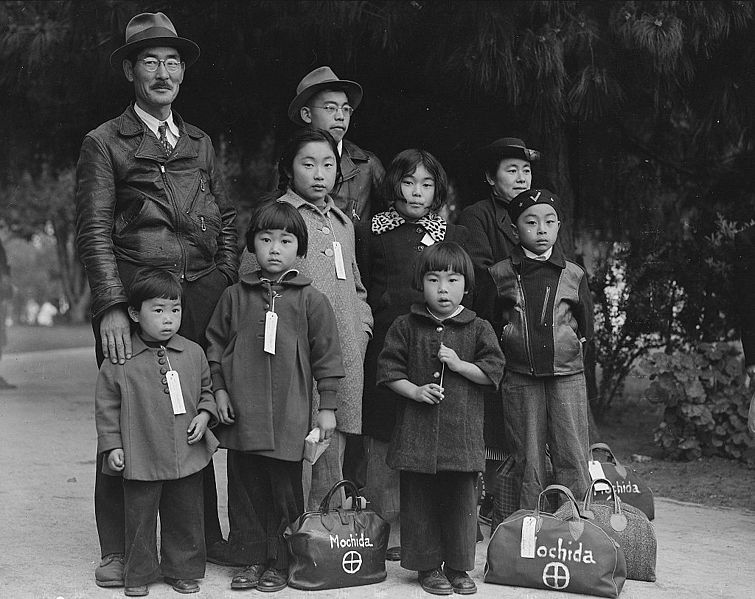Virginia mayor holds up WWII Japanese interment camps as rationale to shut out Syrian refugees


Virginia Gov. Terry McAuliffe (D) has declined Republican requests to try and keep Syrian refugees from resettling in Virginia, so on Wednesday, Roanoke Mayor David Bowers took action. Bowers, also a Democrat, said in a statement that in light of the bombing of a Russian passenger plane, the terrorist attacks in Paris, and the "murderous threats to our nation's capital" — all claimed by the Islamic State — he'd asked local authorities to "suspend and delay any further Syrian refugee assistance until these serious hostilities and atrocities end, or at the very least until regarded as under control by U.S. authorities."
"Roanoke is a welcoming city," he said, but "at least for a while into the future, it seems to me to be better safe than sorry." To further explain why Roanoke should bar refugees from Syria, Bowers cited yet another Democrat: "I'm reminded that President Franklin D. Roosevelt felt compelled to sequester Japanese foreign nationals after the bombing of Pearl Harbor, and it appears that the threat of harm to America from ISIS now is just as real and serious as that from our enemies then." That got people's attention.
The Democratic leadership in Virginia was less than pleased with his citation of the Japanese internment camps, and neither were civil libertarians or the Roanoke City Council. "When you hear his statement, think David Bowers, not Roanoke," said Vice Mayor David Trinkle. Hillary Clinton kicked him off her Virginia Leadership Council, with presidential campaign spokesman Josh Schwerin explaining: "The internment of people of Japanese descent is a dark cloud on our nation's history and to suggest that it is anything but a horrible moment in our past is outrageous."
Subscribe to The Week
Escape your echo chamber. Get the facts behind the news, plus analysis from multiple perspectives.

Sign up for The Week's Free Newsletters
From our morning news briefing to a weekly Good News Newsletter, get the best of The Week delivered directly to your inbox.
From our morning news briefing to a weekly Good News Newsletter, get the best of The Week delivered directly to your inbox.
Actor George Takei, writing on Facebook, fact-checked Bowers and invited him to come watch the Broadway show about Takei's childhood in a Japanese interment camp:
The internment (not a "sequester") was not of Japanese "foreign nationals," but of Japanese Americans, two-thirds of whom were U.S. citizens. I was one of them, and my family and I spent four years in prison camps because we happened to look like the people who bombed Pearl Harbor.... We were judged based on who we looked like, and that is about as un-American as it gets.... Mayor Bowers, one of the reasons I am telling our story on Broadway eight times a week in Allegiance is because of people like you. You who hold a position of authority and power, but you demonstrably have failed to learn the most basic of American civics or history lessons. [George Takei]
Congress apologized for the Japanese interment camps in 1988, saying they were based on racial prejudice and "a failure of political leadership," the Richmond Times-Dispatch notes. In 1990, President George Bush sent apology letters and compensation checks to the survivors of the camps.
Bowers didn't back down. "It appears that the threat of harm to America from ISIS now is just as real and serious as that from our enemies then," he told WDBJ7 News. "I understand how difficult a decision that [FDR] made, but in light of what was going on at the time I think he made the right decision and I think the right decision now is not to have Syrian refugees here, now." He added, "I think people are worried, people are fearful, and this is a scourge upon the earth and we need to stand up against it." And to be clear, the scourge Bowers thinks Roanoke needs to stand up against is Syrian refugees, not fear itself. Last week, Bowers said he won't be running for reelection next year.
Sign up for Today's Best Articles in your inbox
A free daily email with the biggest news stories of the day – and the best features from TheWeek.com
Peter has worked as a news and culture writer and editor at The Week since the site's launch in 2008. He covers politics, world affairs, religion and cultural currents. His journalism career began as a copy editor at a financial newswire and has included editorial positions at The New York Times Magazine, Facts on File, and Oregon State University.
-
 British warship repels 'largest Houthi attack to date' in the Red Sea
British warship repels 'largest Houthi attack to date' in the Red SeaSpeed read Western allies warn of military response to Iranian-backed Yemeni rebels if attacks on ships continue
By Richard Windsor, The Week UK
-
 Houthi rebels claim Red Sea ship attacks
Houthi rebels claim Red Sea ship attacksspeed read Iran-backed Yemeni group vows to escalate aggression towards Israel-linked vessels in revenge for Gaza war
By Harriet Marsden, The Week UK
-
 Israel plans next phase of Gaza war as first hostages released
Israel plans next phase of Gaza war as first hostages releasedSpeed read After four-day ceasefire 'we will not stop' until destruction of Hamas, says Israel
By Harriet Marsden, The Week UK
-
 Mob storms Russian airport 'looking for Jews'
Mob storms Russian airport 'looking for Jews'Speed Read Plane from Israel surrounded by rioters chanting antisemitic slogans after landing in Russia's Dagestan region
By The Week UK
-
 Tuberville's military promotions block is upending lives, combat readiness, 3 military branch chiefs say
Tuberville's military promotions block is upending lives, combat readiness, 3 military branch chiefs saySpeed Read
By Peter Weber
-
 Ukraine's counteroffensive is making incremental gains. Does it matter in the broader war?
Ukraine's counteroffensive is making incremental gains. Does it matter in the broader war?Speed Read
By Peter Weber
-
 US commissions first-ever Navy ship in a foreign port
US commissions first-ever Navy ship in a foreign portSpeed Read
By Justin Klawans
-
 British spy chief, Wagner video suggest Prigozhin is alive and freely 'floating around'
British spy chief, Wagner video suggest Prigozhin is alive and freely 'floating around'Speed Read
By Peter Weber, The Week US


